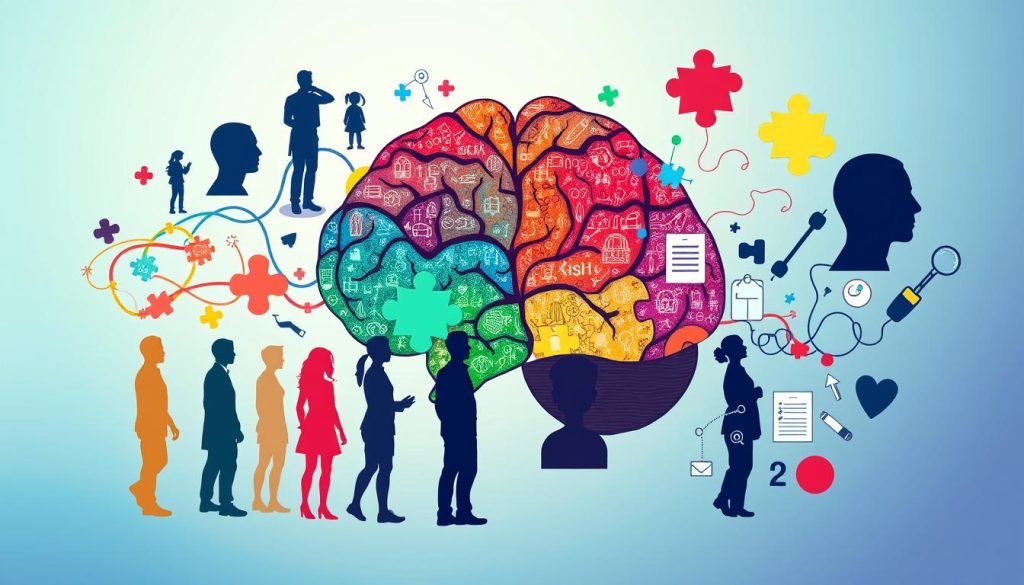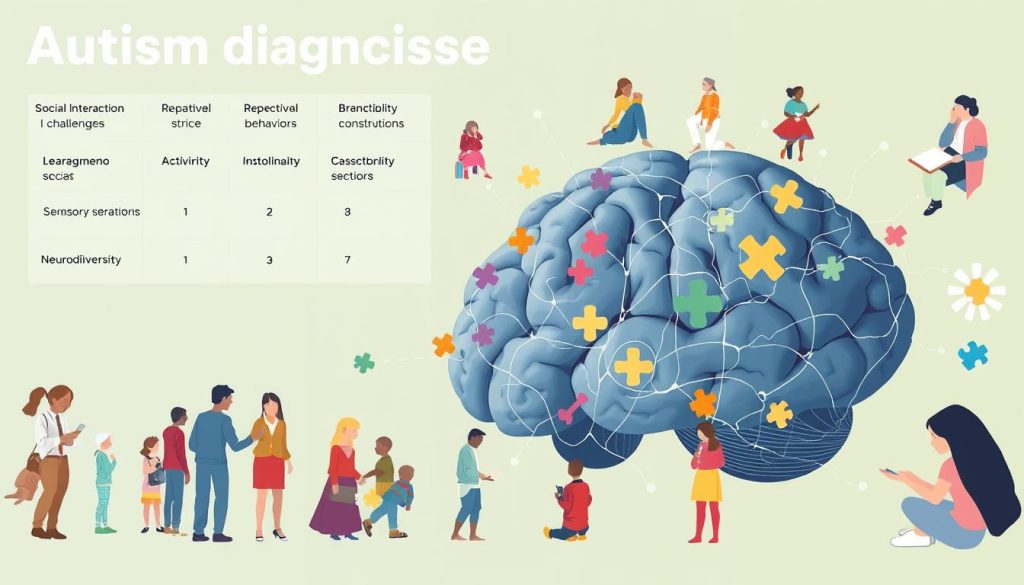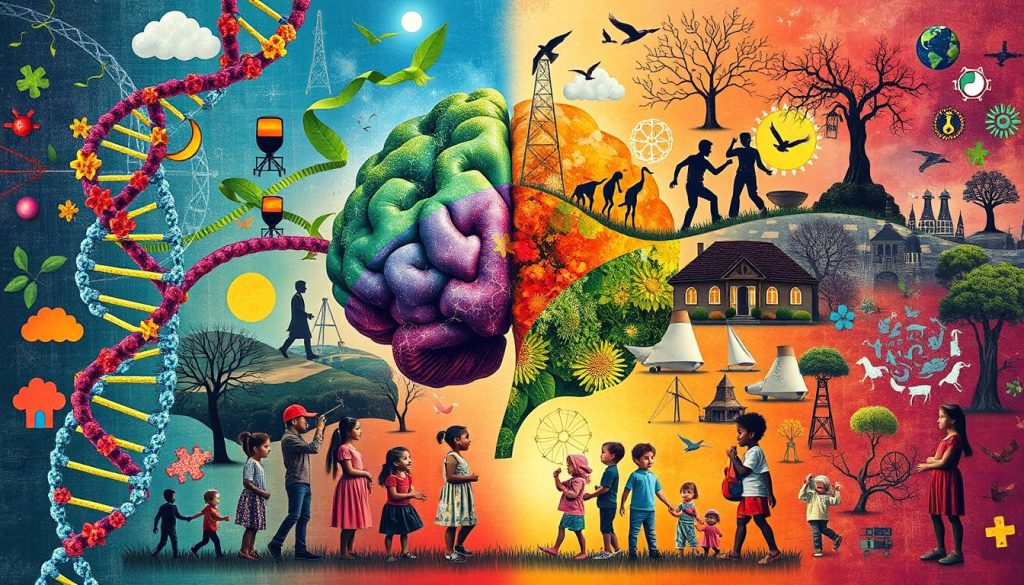Autism Spectrum Disorder (ASD) is a complex condition that affects millions globally. It involves challenges in social interaction, communication, and behavior. Knowing about ASD is key for families, educators, and society.
Every person with ASD is different, showing unique symptoms. These can include trouble in social situations, repetitive actions, and being sensitive to certain sounds or sights. As we learn more about ASD, we can better support those on the spectrum.
By diving into the details of ASD, we can build a more inclusive world. This understanding helps create better support systems and awareness. It highlights the strengths and challenges of individuals with autism.
Defining Autism Spectrum Disorder: A Modern Understanding
The way we define autism has changed a lot. Today, autism is a complex condition that affects how people interact and communicate. Let’s look at how our understanding of autism has grown.
Historical Evolution of Autism Definition
Back then, autism was seen as a single condition. Doctors first talked about it in the 1940s. They thought it was rare and only hit children.
But, we’ve learned that autism is more common. It affects people of all ages.
Current Medical Classification
Now, we call it Autism Spectrum Disorder (ASD). This change happened in 2013 with the DSM-5. It’s a key medical guide.
It groups different types of autism under one name. This helps doctors understand what autism means for each person better.
Spectrum-Based Approach to Understanding ASD
We now see autism as a spectrum. This means it affects people in many ways. Some need a lot of help, while others need less.
The spectrum idea shows that each person with autism is unique. It also shows that autism traits can vary a lot from one person to another.
Understanding autism has come a long way. We now know it’s not one-size-fits-all. This modern view helps us support people with autism better. It helps us see their individual strengths and challenges.
What Does Autism Mean in Today’s Medical Context
Autism Spectrum Disorder (ASD) is a complex condition affecting the brain’s development. It shows a range of symptoms. Today, doctors understand autism better and have updated how they diagnose it.
Now, doctors see ASD as a spectrum. This means they recognize the many ways people with autism experience challenges. This new view helps doctors create more tailored treatment plans for each person.

- Persistent difficulties in social communication and interaction
- Restricted, repetitive patterns of behavior or interests
- Symptoms present in early childhood
- Significant impact on daily functioning
Autistic disorder symptoms can vary a lot. Some people might face mild challenges, while others deal with more severe ones. Common signs include:
| Social Symptoms | Behavioral Symptoms |
|---|---|
| Difficulty maintaining eye contact | Repetitive movements or speech patterns |
| Challenges in understanding social cues | Intense focus on specific interests |
| Trouble forming and maintaining relationships | Adherence to strict routines |
Today, doctors use tools like the DSM-5 to diagnose ASD. This ensures they follow the same criteria. It helps people get the right support and care they need.
Core Characteristics of Autism Spectrum Disorder
Autism Spectrum Disorder (ASD) has unique traits. These often show up in early childhood. It’s key to spot autism in children signs. Knowing these core features helps parents and caregivers support those with ASD.
Social Communication Challenges
Children with ASD may find social interactions hard. They might avoid eye contact or struggle to keep up in conversations. These issues can make it tough for them to make friends and handle social situations.
Restricted and Repetitive Behaviors
Repetitive actions are common in ASD. This includes:
- Lining up toys in specific orders
- Repeating certain words or phrases
- Insistence on following rigid routines
- Intense focus on particular interests
Sensory Processing Differences
Many with ASD have unique sensory sensitivities. They might get overwhelmed by loud noises or bright lights. Others might seek out intense sensory experiences. These differences can greatly impact their daily lives and behavior.
Spotting these core traits is key for early support. If you see these signs in a child, talking to a healthcare professional is a good step.
Early Signs and Symptoms of Autism in Children
Spotting autism in kids early is key. Parents often see the first signs of autism spectrum disorder in their child’s early years. Let’s look at some important autistic behavior characteristics to watch for.
Children with autism might find social cues hard. They might not make eye contact or respond to their name. They could also struggle to understand gestures or facial expressions. These social challenges are often early signs.
Communication can also show signs. Delayed speech or odd speech patterns are red flags. Some kids might repeat words or phrases they hear, known as echolalia.
Repetitive behaviors are common signs of autism in kids. This includes hand-flapping, rocking, or spinning. Some kids might line up toys or get upset when routines change. They may also have intense interests in specific topics.
| Age | Potential Autism Signs |
|---|---|
| 6-12 months | Limited eye contact, no babbling |
| 12-18 months | No single words, reduced pointing or waving |
| 18-24 months | No two-word phrases, loss of previously acquired skills |
| 2-3 years | Limited pretend play, difficulty with peer interactions |
Sensory issues can also be present. Some kids might be too sensitive to sounds, lights, or textures. Others might seek out sensory experiences, like spinning or touching certain objects repeatedly. These behaviors are part of the complex nature of autism spectrum disorder.
Remember, every child is unique. If you notice these signs, talk to your pediatrician. Early detection can lead to better support and outcomes for children with autism.
Different Types of Autism Spectrum Disorders
Autism Spectrum Disorder (ASD) includes many conditions. Knowing about the types helps us see the different needs and strengths. Let’s look at the main subtypes of ASD.
Classic Autistic Disorder
This type faces big challenges in social interaction, communication, and behavior. Those with classic autism often start talking later and repeat actions. They find it hard to change plans and have deep interests.
Asperger’s Syndrome
Asperger’s is marked by smartness and normal speaking skills. People with Asperger’s show traits of high-functioning autism, like intense focus and trouble with social signs. They might speak well but struggle with body language.
PDD-NOS
Pervasive Developmental Disorder-Not Specified (PDD-NOS) is for those who don’t fit into other ASD types. They might have milder symptoms or traits from different types of autism.
Childhood Disintegrative Disorder
This rare condition starts with normal growth until age 2-4. Then, skills like talking, social skills, and moving are lost. It’s seen as one of the more serious forms of autism.
| Subtype | Key Features | Common Traits |
|---|---|---|
| Classic Autism | Significant social and communication challenges | Delayed language, repetitive behaviors |
| Asperger’s Syndrome | Average or high intelligence | Strong interests, social difficulties |
| PDD-NOS | Milder or mixed symptoms | Varied presentation of ASD traits |
| Childhood Disintegrative Disorder | Regression after normal early development | Loss of acquired skills |
The Diagnostic Process for ASD

Diagnosing autism spectrum disorder (ASD) is a detailed process. It begins with developmental screenings during regular check-ups. If there are concerns, a deeper assessment follows.
Doctors look at a child’s behavior and developmental history to diagnose ASD. They use tools like the Autism Diagnostic Observation Schedule (ADOS) and the Autism Diagnostic Interview-Revised (ADI-R). These help assess social skills, communication, and repetitive behaviors.
The team for diagnosis includes:
- Pediatricians
- Psychologists
- Speech-language pathologists
- Occupational therapists
This team approach ensures a complete evaluation. Parents are key, sharing details about their child’s development and behaviors.
After diagnosis, talking about treatment options starts. This might include behavioral therapies, educational plans, and support services. The aim is to create a plan that fits the individual’s needs and strengths.
Early diagnosis is vital. It leads to timely interventions that can greatly improve outcomes for those with ASD. Remember, each person’s autism journey is unique. Support should be tailored to their needs.
Understanding High-Functioning Autism
High-functioning autism is a term for people on the autism spectrum with average or above-average intelligence. They show unique traits that differ from others with autism spectrum disorder (ASD).
Characteristics and Traits
Those with high-functioning autism have specific traits. They often have strong language skills but find social cues hard to understand. They also have intense interests and prefer routines.
Common Challenges
Despite their abilities, they face challenges. These include making friends, understanding social norms, and managing sensory sensitivities. They might find it hard with changes in routine or unexpected situations.
Strengths and Abilities
High-functioning autistic individuals have remarkable strengths. They often have exceptional memory, attention to detail, and analytical thinking. Many excel in technology, science, or the arts because of their focused interests and unique perspectives.
| Trait | Challenge | Strength |
|---|---|---|
| Social interaction | Difficulty reading social cues | Direct communication style |
| Interests | Fixation on specific topics | Deep knowledge in areas of interest |
| Sensory processing | Sensitivity to stimuli | Heightened awareness of surroundings |
| Cognitive abilities | Struggle with abstract concepts | Strong logical and analytical skills |
Environmental and Genetic Factors in Autism
Scientists are working hard to find out what causes autism spectrum disorder. They look at both genetic and environmental factors. Knowing these helps us understand what autism is.

Genetics play a big role in autism. Some gene changes can raise the risk of getting ASD. Kids with autism are more likely to have siblings with it too.
Environmental factors are also being studied. Things like when parents were born, how healthy the mom was during pregnancy, and chemicals exposure might play a part. But, no single thing has been found to cause autism.
Now, research shows that genes and environment work together. This idea, called epigenetics, looks at how the environment can change how genes work. This might explain why autism can look different in different people.
- Gene mutations and variations
- Parental age at conception
- Maternal health conditions
- Exposure to certain medications or toxins
- Complications during pregnancy or birth
As we learn more, our view of autism changes. This new knowledge helps us help people with autism from the start. By understanding genes and environment, we get closer to helping everyone with autism.
Support and Treatment Options for Individuals with ASD
Autism spectrum disorder (ASD) brings its own set of challenges. But, there are many effective ways to help. It’s important to understand the symptoms of autistic disorder to provide the right support.
Behavioral Interventions
Behavioral therapies are key in managing ASD symptoms. Applied Behavior Analysis (ABA) helps improve social skills and reduce bad behaviors. Other methods include cognitive behavioral therapy and social skills training.
Educational Support
Schools have special programs for students with ASD. These include:
- Individualized Education Plans (IEPs)
- One-on-one aides
- Sensory-friendly classrooms
- Speech and language therapy
These supports help kids with ASD do well in school.
Therapeutic Approaches
There are many therapies for specific symptoms of autistic disorder:
| Therapy Type | Focus Area | Benefits |
|---|---|---|
| Occupational Therapy | Daily living skills | Improves independence |
| Speech Therapy | Communication | Enhances verbal and non-verbal skills |
| Music Therapy | Emotional expression | Boosts social interaction |
Using a mix of these treatments often works best. Each person with ASD is different. So, treatment plans should be made just for them and changed often for the best results.
Living with Autism: Daily Challenges and Strategies
Living with autism means facing unique daily challenges. People with autism often struggle in social situations, with sensory processing, and with changes in routine. These challenges come from autistic behavior characteristics that affect their lives in many ways.

Social interactions can be tough for those with autism. They might find it hard to understand nonverbal cues or keep up in conversations. This can make them feel isolated or misunderstood in both personal and professional life.
Sensory sensitivities are another big challenge. Bright lights, loud noises, or certain textures can upset or worry them. It’s important to find ways to manage these sensitivities to get through everyday situations.
Adapting to changes in routine is also hard for individuals with autism. When their schedule or environment changes unexpectedly, it can cause stress or anxiety. It’s key to develop strategies to handle these situations well.
| Challenge | Strategy |
|---|---|
| Social interactions | Practice social skills, use visual aids |
| Sensory sensitivities | Create sensory-friendly spaces, use noise-canceling headphones |
| Routine changes | Use visual schedules, prepare for transitions |
| Communication difficulties | Utilize alternative communication methods, seek speech therapy |
By using these strategies, people with autism can tackle daily challenges and enhance their life quality. Understanding autistic behavior helps create supportive environments. These environments promote independence and success.
The Role of Early Intervention in ASD
Early intervention is vital for kids with autism spectrum disorder (ASD). Spotting signs of autism early can greatly improve their future. It also helps their families a lot.
Benefits of Early Detection
Finding autism treatment early can change a child’s life. Early detection means kids can start learning important skills sooner. They can also face less of the challenges that come with ASD.
These benefits include better communication, social skills, and thinking abilities.
Available Intervention Programs
There are many programs to help kids with ASD. Applied Behavior Analysis (ABA), speech therapy, and occupational therapy are common. These help kids learn to talk, socialize, and do everyday tasks.
Family Support Systems
Family support is essential for early intervention. There are programs for parents, support groups, and respite care. These help families understand and manage their child’s needs.
Early intervention can greatly shape a child’s future. By spotting autism signs early and getting the right help, families can give their kids a great start.
Understanding Autism in Adults
Many adults with autism are not recognized, leading to late diagnoses. They face unique challenges in social situations and work. Their behavior is different from when they were children.

Adults with autism have big hurdles in daily life. They might struggle with relationships, jobs, and living alone. Too many people around can be too much, and talking to others can be hard.
But, many adults with autism are very skilled. They do well in jobs that need detail, pattern finding, or logical thinking. Using these strengths can lead to good careers and personal growth.
| Common High-Functioning Autism Traits in Adults | Coping Strategies |
|---|---|
| Difficulty with social cues | Social skills training |
| Intense focus on specific interests | Channeling interests into career paths |
| Sensory sensitivities | Creating accommodating environments |
| Rigid routines | Developing flexible schedules |
Support for adults with autism is key. Therapy, job training, and support groups help a lot. Employers can make workplaces better by being clear, structured, and accommodating.
It’s important to understand autism in adults. This helps create inclusive places and lets people reach their goals. By accepting and supporting autistic behavior, we can make society better for everyone.
Resources and Support Networks for ASD
Understanding autism can feel overwhelming, but you’re not alone. Many organizations offer valuable resources and support for those with ASD and their families. These networks provide important information about treatment options and help with daily challenges.
Local support groups create a sense of community. Families can share experiences and advice. They host events and workshops, helping people connect.
Online forums and social media groups offer similar support. You can access them from home.
Educational materials are key to understanding ASD. Libraries, autism centers, and reputable health websites have a lot of information. These resources help families learn about treatment options and managing daily life.
Community services, like therapy centers and inclusive programs, provide practical support. They aim to improve quality of life and promote independence. Remember, asking for help is a sign of strength. There’s a wide network ready to support you on your ASD journey.
FAQ
Q: What does autism mean?
A: Autism, or Autism Spectrum Disorder (ASD), is a complex condition. It affects how people communicate, have interests, and behave. It’s a spectrum, meaning it impacts people differently and to varying degrees.
Q: How is autism diagnosed?
A: Diagnosing autism involves a detailed evaluation. This includes observations, interviews, and standardized tests. Doctors use the Diagnostic and Statistical Manual of Mental Disorders (DSM-5) to diagnose based on behavior and development.
Q: What are the early signs of autism in children?
A: Early signs in children may include limited eye contact and delayed speech. They might also show little interest in friends, repeat actions, and react strangely to sounds or sights. Not all children with autism will show all these signs.
Q: Is there a cure for autism?
A: There’s no cure for autism, but treatments can help manage symptoms. These include behavioral therapies, educational support, and sometimes medication for other conditions.
Q: What causes autism spectrum disorder?
A: Autism’s causes are not fully known. Research points to a mix of genetic and environmental factors. Vaccines do not cause autism, a myth debunked by science.
Q: What are the different types of autism spectrum disorders?
A: The DSM-5 now uses one diagnosis for Autism Spectrum Disorder. But, terms like Classic Autistic Disorder and Asperger’s Syndrome are sometimes used to describe where someone falls on the spectrum.
Q: What is high-functioning autism?
A: High-functioning autism isn’t an official term. It refers to those with average or above-average intelligence and fluent speech. Yet, they face challenges in social communication and may have restricted interests or repetitive behaviors.
Q: How does autism affect adults?
A: Autism in adults can affect employment, relationships, and living independently. But, many adults with autism lead fulfilling lives with the right support. Some may get a late diagnosis, which can help them access resources.
Q: What treatment options are available for autism?
A: Treatments include behavioral interventions, speech and occupational therapy, and social skills training. Educational support and sometimes medication for other conditions can also help. The best approach often combines therapies tailored to the individual.
Q: How can I support someone with autism?
A: Supporting someone with autism means understanding their unique needs. Be patient in social interactions, respect their sensory sensitivities, and advocate for accommodations. Acceptance and appreciation of neurodiversity can greatly help.

















